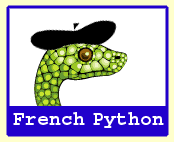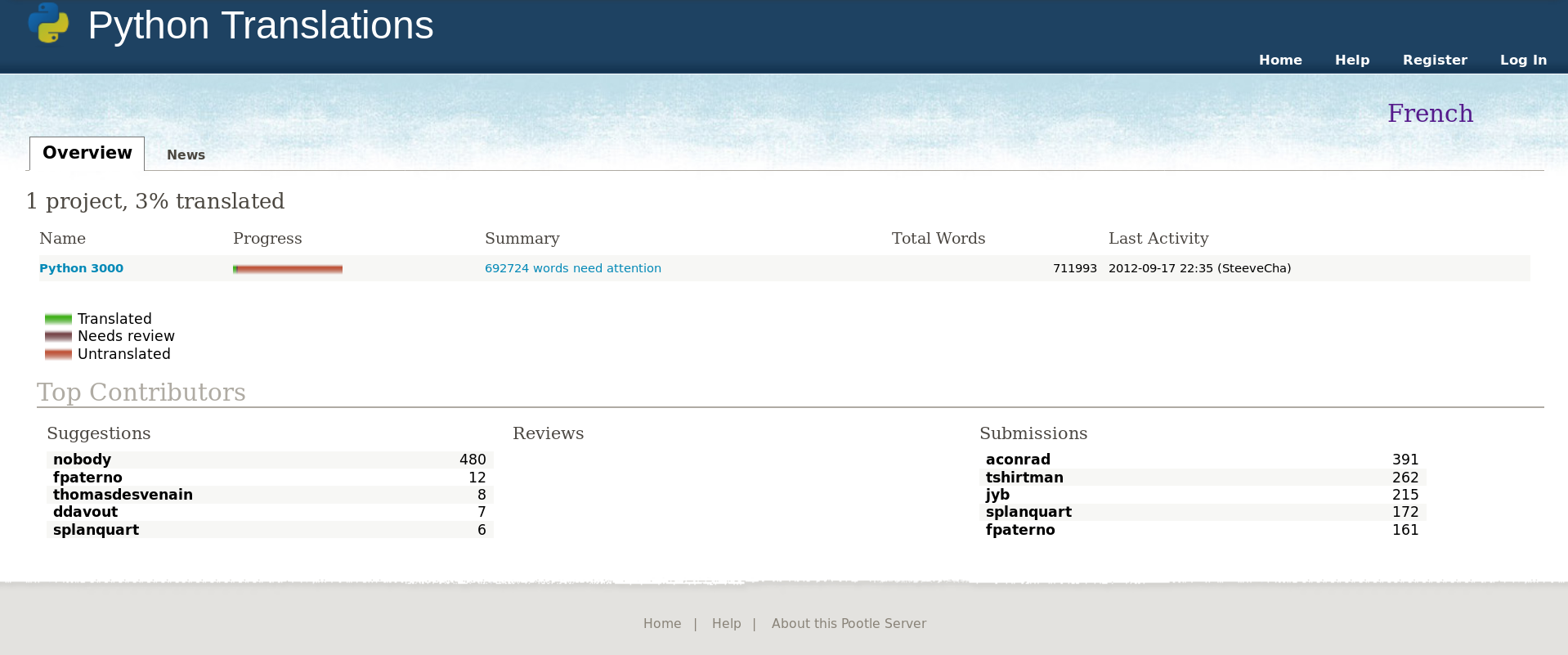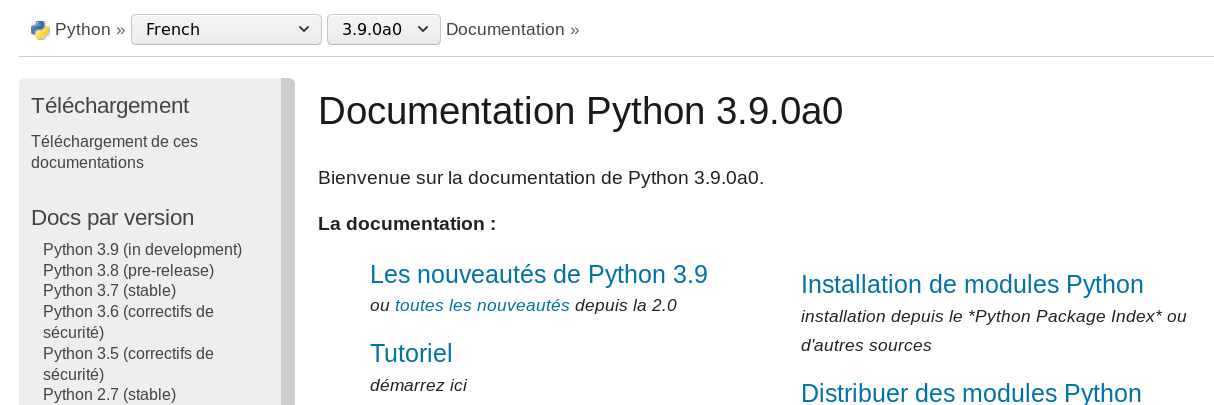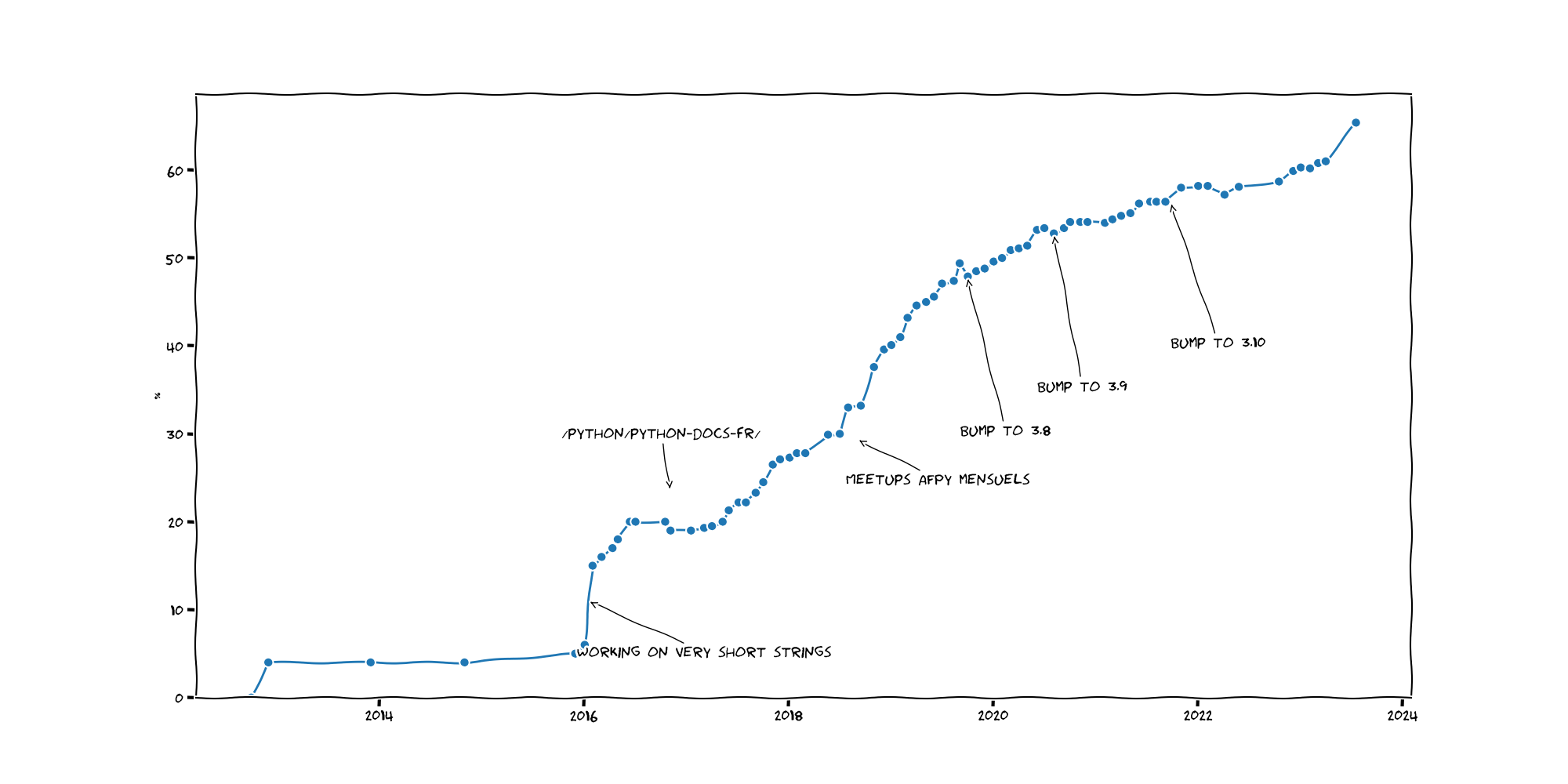4.1 KiB
docs.python.org/fr
Julien Palard
WriteTheDocs Paris 2019
Julien Palard
- Python core dev and documentation expert
- Python teacher and coach at:
- Sup'Internet
- CRI-Paris
- Makina Corpus
- …
History
History
- Python is 28 years old,
- its doc is written in reStructuredText,
- compiled in HTML, PDF, epub, txt using Sphinx,
- more than one million words,
- daily changes.
Notes: 28 years old as of 2019 (first release 1991).
More than "daily" for 3.7 stable: 170 commits on Doc/ over 120 days.
History
- 2000: Project frpython on sourceforge
- 2001: Translating Python 2.0
- 2007: Python Doc moves from Latex to Sphinx & rst
- 2010: GSoC Project to add i18n to Sphinx
- 2011: 2% translated on pottle.python.org
- 2012: pottle dead, AFPy team migrates to github
- 2015-12: Resurected the project, alone for one year
- 2016-03: docs.python.org/fr/ on python-ideas.
- 2017-03: PEP 545
Notes:
2000: Latex to Latex, scripté en Python 1.5.2 (populaire à l'époque) 2007: Hello Sphinx, created for Python by Georg Brandl, now used by many like Linux Kernel 2012: Few people contributed during a month, and left for two years. 2015: Alone for one year
https://lists.afpy.org/mailman/private/afpy-membres/2012-September/005747.html http://frpython.sourceforge.net/
2000
Notes: https://web.archive.org/web/20010302160925/http://sourceforge.net/projects/frpython
2001
Notes: http://quentel.pierre.free.fr/python-trad/intro.html
2012
2019
Progression
Notes:
- 2016 jan: very short untranslatable strings
- 2016 june: autofill whatsnew.po
- 2017: PEP 545
How do we work?
Mandatory meet point is:
github.com/python/python-docs-*
But every language can use their own tools as long as they push on the meet point.
How do we work?
- Some are using Transifex (ja, zh, pt_BR, ko, ...)
- Some are using git (fr, it, es)
- One could use any other tool…
Notes: The french fries team (fr,it,es) is using git.
How do we work, in France?
github and pull requests
How do we work, in France?
It allows us to review and give feedback
But git is hard!
Yes.
Note: But it looks like it's the mandatory way to contribute to most open source projects. We want to make the translation a way to learn how to contribute to an open source project. It's like a git sandbox :)
Also it allows offline work that a lot of us do (in the train).
Tools
How do we cope with:
- Around 500
.pofiles, - more than one million words,
- 45k paragraphs,
- french in reStructuredText in gettext imbrication?
#: ../Doc/library/stdtypes.rst:373
msgid "the greatest :class:`~numbers.Integral` <= *x*"
msgstr "le plus grand :class:`~numbers.Integral` <= *x*"
Tools
pypi.org/p/pospell
pospell is a tool using hunspell to spell check inside a
.po file while ignoring reStructuredText syntax.
Tools
pypi.org/p/powrap
powrap is a tool using msgcat to rewrap all .po files to a
fixed width of 79 columns. We're enforcing this wrapping via the CI to
reduce the noise in git logs.
Tools
pypi.org/p/potodo
potodo helps us listing what still needs to be done in this mess
of 500 files. It also synchroniszes with github issues to tell if
someone is already working on a file, avoiding conflicts.
Tools
pypi.org/p/pomerge
pomerge helps us propagating translations from a branch to another,
from a repo to another, or simply from a file to another.
Tools
poautofill
poautofill uses automatic translation to translate a whole file.
This is bad from so many aspects, but it just helps me to avoid
spending time trying to remember some vocabulary when I'm offline.
Et après ?
Venez nous aider :
- Sur github.com/python/python-docs-fr
- Aux ateliers mensuels (meetup AFPy Paris)
- Au sprint (2 jours) à La PyCon Fr à Bordeaux à partir du 31 oct 2019.







